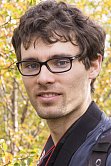MSc Christoph Kurze

Research Interests
My current research focuses on reciprocal adaptations between an intracellular gut pathogen Nosema ceranae and its honeybee host (Apis mellifera). To tackle fundamental questions in evolutionary ecology I am using an integrative research approach, covering qualitative & quantitative genetics, quantitative proteomics, immunohistochemistry, behaviour and energetics.
Curriculum vitae
Education
- 2012/11-present:
- PhD candidate, Martin-Luther-Universität Halle-Wittenberg
- Topic: "Host-parasite co-evolution in the honeybee Apis mellifera"
- Supervisor: Prof. Dr. Dr. h.c. Robin FA Moritz
- 2010/10-2012/06:
- MSc Biodiversity, Evolution & Ecology, Freie Universität Berlin
- MSc Thesis: "Identity and prevalence of Dipylidium spp. in Serengeti spotted hyenas using a non-invasive approach: do host's life history traits matter?"
- Supervisors: Dr. Marion L. East and Prof. Dr. Heribert Hofer, Leibniz Institute for Zoo and Wildlife Research (IZW)
- 2009/09-2010/06:
- ERASMUS, University of Aberdeen (UK)
- Main focus: Animal Evolution, Population Ecology and Animal Physiology
- BSc Thesis: "Energetic consequences of infection with African trypanosomes"
- Supervisors: Dr. Jeremy M. Sternberg and Prof. Dr. John R. Speakman
- 2007/10-2010/08:
- BSc Biology, Justus-Liebig-Universität Gießen, Germany
Scientific publications
- Kurze C, Routtu J, and Moritz RFA (in press): Parasite resistance and tolerance in honeybees at the individual and social level. Zoology.
- Kurze C, Mayack C, Hirche F, Stangl GI, Le Conte Y, Kryger P, and Moritz RFA (2016): Nosema spp. infection causes no energetic stress in tolerant honeybees Parasitol Res 1-8.
- Kurze C, Le Conte Y, Dussaubat C, Erler S, Kryger P, Lewkowski O, Müller T, Widder M, and Moritz RFA (2015): Nosema tolerant honeybees (Apis mellifera) escape parasitic manipulation of apoptosis. Plos One 10, e0140174.
- East ML, Kurze C, Wilhelm K, Benhaiem S, and Hofer H (2013): Factors influencing Dipylidium sp. infection in a free-ranging social carnivore, the spotted hyaena (Crocuta crocuta) Int J Parasitol Parasites Wildl 2, 257-265.
Scientific awards & scholarships
- DAAD fellowship, German academic exchange service, supporting my research visit at The University of Western Australia in 2015
- ABF student award 2015, Foundation for the Preservation of Honey Bees, Inc.
- Evenius Award 2014, Society of bee research (AG Institute für Bienenforschung)
- Travel grant 2014, Martin-Luther-Universität Halle- Wittenberg
- IUSSI student travel award 2014, International Union for the Study of Social Insects
- ERASMUS scholarship 2009
Conferences
Oral contributions
- 2015:
- North American Beekeeping Conference (ABF) in Anaheim, California (USA) invited
- 2014:
- Symposium of the DFG SPP 1399 Host-Parasite Coevolution in Kiel
- EurBee in Murcia (Spain)
- International Congress on Invertebrate Pathology and Microbial Control (SIP) in Mainz
- Congress of the IUSSI in Cairns (Australia)
- Annual conference for bee research (AG Institute für Bienenforschung) in Marburg
- 2013:
- Host-Parasite Coevolution Symp. & RCNE meeting in Berlin
- Annual conference for bee research (AG Institute für Bienenforschung) in Würzburg
- Central European IUSSI in Cluj-Napoca (Romania)
Poster contributions
- 2015:
- North American Beekeeping Conference 2015 (ABF) in Anaheim, California (USA)
- ESEB 2013 in Lisbon (Portugal)
Scientific internships, research visits & workshops
- 2015:
- CIBER & PEB ARC centre of excellence, University of Western Australia (4 months)
- 2014:
- CIBER, University of Western Australia (short visit)
- Institut national de la recherche agronomique (INRA) in Avignon (short visit)
- Oncology research group, Universitätsklinikum Halle (4 months)
- sTRANS-BEE workshop, German Centre for Integrative Biodiversity Research (iDiv)
- 2013:
- Institut national de la recherche agronomique (INRA) in Avignon (3 weeks)
- Nosema workshop, University of Münster
- 2010-2012:
- Institute of Experimental Ecology, University of Ulm (2 months)
Field assistant in bat monitoring, 'Biodiversity Exploratories' (DFG SPP 1374). - Applied Zoology & Animal Ecology, Freie Universität Berlin (3 months)
Distinction of the odour signature in Chinese cabbage plant (GC-MS) used for mate-choice experiments and pilot study on odour perception (EAG) in two Phaedon cochleariae populations. - Institute of Biological and Environmental Sciences (IBES), University of Aberdeen (3 months field research in Iceland)
Field assistant of Dr. Fredrik Christiansen studying the effect of whale watching boats on dive behaviour, movement and spatial distribution of Minke whales (Balaenoptera acutorostrata).
- Institute of Experimental Ecology, University of Ulm (2 months)
Current collaborations
- Dr. Boris Baer & Dr. Ryan Dosselli, CIBER, The University of Western Australia
- Dr. Yves Le Cont, Abeilles et Environnement, INRA Avignon
- Dr. Per Kryger, Dept. of Agroecology, Aarhus University
- Dr. Thomas Müller, Dept. Internal Medicine IV, Universitätsklinikum Halle
- Dr. Christopher Mayack, Biology Department, Swarthmore College (USA)
- Prof. Dr. Gabriele I. Stangl & Dr. Frank Hirche, Institute of Agricultural and Nutritional Sciences, Martin-Luther-Universität Halle- Wittenberg



